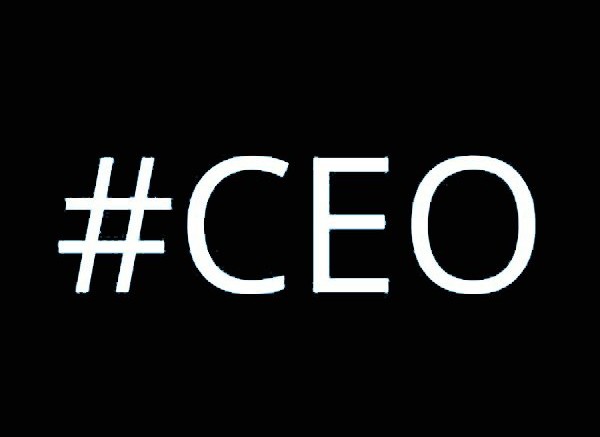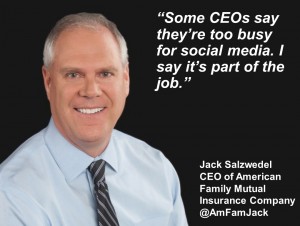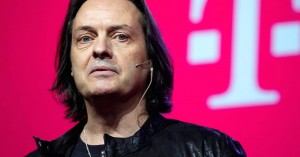What does it mean to be a ‘social CEO’? What qualifies a leader to get the label? All the CEOs I’ve interviewed so far share certain characteristics. Some are stronger in some areas than others, but they all show these features to some degree.
They have the right mindset
Before anything else, a social CEO requires a certain mindset – one that understands the value of social interaction with employees, customers and potential customers. It’s what people are increasingly coming to expect. If you don’t get this, maybe you’re in danger of becoming irrelevant. It’s that important.
They are all on Twitter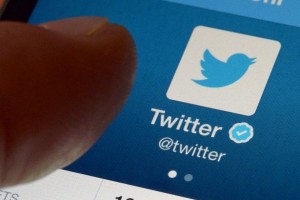
Having a LinkedIn profile isn’t enough. LinkedIn in passive (I’d almost say lifeless), but Twitter is dynamic; things happen in real time – and you’re exposed. This is where a leader can truly show their social credentials.
They do their own Tweets
Having a Twitter profile and then getting someone else to post or ‘interact’ on your behalf is worse than bad – it’s dishonest. Authenticity is crucial. That’s not to say you can’t get help or advice – in fact you should, especially when you’re just starting out Twitter. But don’t fake it – do it yourself or don’t do it at all.
They are transparent
Adding to my point above, being on social media – especially Twitter – requires transparency. How much or how little depends on the individual and how much of themselves they decide to show. Having a basic profile but not sharing information about yourself, your organization or your industry isn’t very transparent. Neither is lack of engagement. It’s only by sharing and interacting with people that leaders can remove the façade of elitism and get closer to stakeholders and employees. Loot at Jack Salzwedel for a great example of transparency.
They are interesting
It’s no good having a huge Twitter following if all you share is corporate PR. All the CEOs I’ve interviewed make their posts interesting, mixing in corporate messages, comments on business or social trends – and even tweets about their hobbies and interests. All of this shows them to be real human beings who their customers and employees can relate to.
They engage externally
Social media – especially Twitter – is all about engagement and conversation. Peter Aceto, CEO of Tangerine Bank in Canada, says: “I’d rather engage in a Twitter conversation with a single customer than see our company try to attract the attention of millions in a Super Bowl commercial.” Talking to his customers on Twitter helps him – and his brand – stand out from the competition. That’s his USP. A CEO obviously can’t respond to every tweet, but they can respond to some.
They engage internally
External engagement is great, but just as important is internal engagement with employees. Having a CEO who talks to his or her staff, asks questions, solicits feedback – and listens – this is powerful stuff.
They post regularly
Tweeting once a month isn’t social! Social CEOs are active on Twitter daily – or at least several times a week.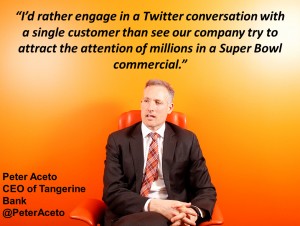
They are humble
OK – not every CEO I’ve featured has displayed humility. A certain John Legere (CEO of T-Mobile America) describes himself as “a vocal, animated, and sometimes foul-mouthed CEO.” No shrinking violet he. But Legere’s the exception – most of the leaders I’ve interviewed are humble and don’t blow their trumpet. Many talk about their employees – publicly acknowledging their achievements. Even John Legere does that.
They share useful information
As I’ve already mentioned, simply broadcasting (and not engaging) isn’t enough. But you can still share useful information about your organization or industry. That’s probably one of the reasons people follow you. So, be informative, but don’t forget the interaction part either.
They are fearless
Social media is public – that’s its beauty and its power. There’s no point in a CEO ‘going social’ if they’re afraid of being taken to task by what they share. You’re human, your customers are human, your employees are human, your shareholders are human. Don’t be afraid to be human on social media.
They are passionate
You’re a leader. Are you passionate about your organization, your industry, your cause, your stakeholders? Of course you are – that’s why you’re where you are. So let this passion and enthusiasm shine through on social media. It’s infectious and people will respond very positively.
Finally – they ARE the brand
You are the head of your organization. By being on social media you’re making a powerful personal statement about yourself and your brand (be it a bank, a charity or a city). You can’t get away with ‘all tweets are my own and don’t reflect my employer’. They do. All the leaders I’ve interviewed use social media to their advantage by embracing it and being their brand online. John Legere of T-Mobile America is the brand’s biggest and most enthusiastic ambassador – and his 3 million Twitter followers love him for it. It’s also a great recruitment tool.
_________________________
How many CEOs actually display any of these characteristics on social media? Not many. They are, as Jim Claussen calls them, ‘Blue Unicorns’ – rarer than rare. But as CEOs and other leaders start to understand how important having a social media presence is for their organization’s reputation, we’ll start seeing a lot more. I predict that in five years’ time it will become a requirement.
